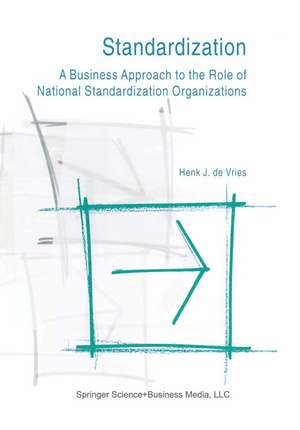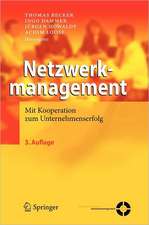Standardization: A Business Approach to the Role of National Standardization Organizations
Autor Henk J. de Vriesen Limba Engleză Paperback – 3 dec 2010
| Toate formatele și edițiile | Preț | Express |
|---|---|---|
| Paperback (1) | 1147.73 lei 38-44 zile | |
| Springer Us – 3 dec 2010 | 1147.73 lei 38-44 zile | |
| Hardback (1) | 1416.79 lei 43-57 zile | |
| Springer Us – 30 noi 1999 | 1416.79 lei 43-57 zile |
Preț: 1147.73 lei
Preț vechi: 1510.17 lei
-24% Nou
Puncte Express: 1722
Preț estimativ în valută:
219.69€ • 238.71$ • 184.66£
219.69€ • 238.71$ • 184.66£
Carte tipărită la comandă
Livrare economică 16-22 aprilie
Preluare comenzi: 021 569.72.76
Specificații
ISBN-13: 9781441951038
ISBN-10: 1441951032
Pagini: 344
Ilustrații: XXII, 320 p.
Dimensiuni: 160 x 240 x 18 mm
Greutate: 0.59 kg
Ediția:Softcover reprint of hardcover 1st ed. 1999
Editura: Springer Us
Colecția Springer
Locul publicării:New York, NY, United States
ISBN-10: 1441951032
Pagini: 344
Ilustrații: XXII, 320 p.
Dimensiuni: 160 x 240 x 18 mm
Greutate: 0.59 kg
Ediția:Softcover reprint of hardcover 1st ed. 1999
Editura: Springer Us
Colecția Springer
Locul publicării:New York, NY, United States
Public țintă
ResearchDescriere
This study fills a gap in standardization literature. It is the first academic analysis of national standardization organizations. These organizations exist in every country and may be private or governmental organizations. The first national standardization th organizations were founded in the early decades of the 20 century and were aimed at rationalizing industrial production. Their mode of operation reflects the sense of co operation at the national level and - in the telecommunications and electrotechnical field - at the intemationallevel as well. Now, however, the scene has changed, with companies operating internationally. Standards for products, processes, and services are crucial factors in determining success or failure on a fiercely competitive market, especially when functional compatibility is a prerequisite, as is the case in computer and telecommunications technologies. As a consequence, rather homogeneous needs of participants in standardization have given way to conflicting interests. This prompts a discussion about the traditional role of national standardization organizations. They increasingly depend on their exclusive links to the international standardization organizations ISO and IEC, and, in the case of Europe, the regional organizations CEN and CENELEC. In many cases, formal standardization organizations are not the obvious bodies for developing standards to meet business needs. Is this inevitable or could they improve performance and regain their market share? Henk de Vries answers this question against the background of current developments in standardization at the international, European, and national levels.
Cuprins
Preface. Prologue. How to read this book? Abbreviations and acronyms. Terms and definitions. Part A: Analysis of National Standardization Organizations. 1. General introduction. 2. Introduction to standards and standardization. 3. Current NSO services. 4. Actor needs. 5. Analysis of NSO standards development. 6. Improvements in NSO standards development. 7. Other NSO services. Part B: Supporting Standardization Theory and Cases. 8. Standardization - what's in a name? 9. Classification of standards. 10. Possibilities for better management system standards. 11. Standardization in service sectors. 12. Mechanisms in the spread of standards. 13. Methods to develop standards. 14. Services related to company standardization. Part C: Results. 15. Summary, conclusions, and recommendations. Annexes.
Recenzii
`This work makes a substantial contribution to the current debate surrounding standardization and the scientific knowledge of this topic. The growing network of researchers within standardization should make use of this study.'
Wilfried Hesser, Professor in Standardization, University of the Federal Armed Forces, Hamburg
Wilfried Hesser, Professor in Standardization, University of the Federal Armed Forces, Hamburg
Notă biografică
Henk de Vries (1957) is Education and Research Officer Standardization at the Rotterdam School of Management, The Netherlands. He is also a Standardization Consultatnt at the Dutch Standardization Institute. De Vries is the author of several publications on standardization.


















